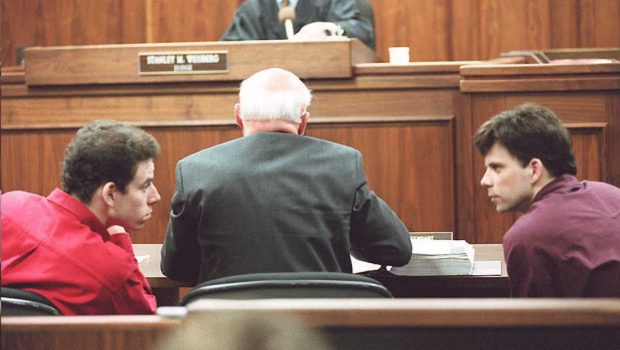Did the Menendez Brothers Inherit Money After Killing Their Parents?

Here’s more about whether Lyle and Erik inherited any money after killing their parents, José and Kitty Menendez, and if so, how much.
Lyle and Erik Menendez continue to serve life sentences in prison for the brutal murders of their parents on August 20, 1989, when the brothers—then 21 and 18—shot and killed them in their family’s Beverly Hills mansion.
Now, 35 years later, the Menendez brothers are the latest subjects of Ryan Murphy and Ian Brennan‘s Monster anthology series. Titled Monsters: The Lyle and Erik Menendez Story, the series stars Nicholas Alexander Chavez and Cooper Koch as Lyle and Erik, with Javier Bardem and Chloë Sevigny portraying their parents, Jose and Kitty Menendez.
But the question remains: Did the Menendez brothers actually inherit any money after the murders? Find out below.
How Much Money Did the Menendez Family Have?
The Menendez family was quite affluent at the time, as José Menendez was a corporate executive at an entertainment company originally known as International Video Entertainment, now known as Artisan Entertainment. Artisan has produced well-regarded films such as Requiem for a Dream and The Blair Witch Project.
According to Forbes, their father had an estate valued at approximately $14.5 million, which he purchased in 1988 for $4 million—equivalent to about $10 million today.
Did the Menendez Brothers Inherit Money?
In the aftermath of their parents’ deaths in 1989, the brothers took control of their father’s estate. In just six months, Lyle and Erik reportedly spent nearly $1 million on parties, travel, and shopping. Lyle spent over $15,000 on three Rolex watches the day before their parents’ funeral, as witnesses later testified. Additionally, Erik racked up thousands in gambling losses and hired a tennis coach for $60,000 a year in hopes of turning professional.
However, after being arrested seven months later, most of the money from José’s estate had been consumed by taxes and legal fees. The Menendez brothers’ separate trials began in July 1993 and ended six months later in mistrials. They were then tried together in October 1995, at which point they were found guilty. By April 1994, Erik and Lyle had already incurred $1,495,000 in criminal defense fees before their final trial.
In 1994, it was reported that $10.8 million had been spent from the estate—just two years before the brothers were sentenced to life in prison. About half of that amount went toward the brothers’ legal fees, including those of attorney Leslie Abramson, who argued that José and Kitty subjected their sons to years of emotional and sexual abuse.
How Much Money Did the Menendez Brothers Inherit?
Once they were found guilty of their parents’ murder, the brothers lost access to the estate. Under California’s “Slayer Statute,” when someone is feloniously murdered, the perpetrator cannot profit from the victim’s estate, regardless of any family relationship.
The Menendez family home sold in 1991 for $3.6 million, resulting in a loss of nearly $1.2 million, all of which went to pay off the mortgage, closing costs, and the Internal Revenue Service. Additionally, a Calabasas house that their parents owned and were renovating, appraised at $2.65 million, sold in 1994 for much less—$1.94 million.
If you or anyone you know has been sexually abused, call the National Sexual Assault Hotline at 1-800-656-HOPE (4673). A trained staff member will provide confidential, judgment-free support as well as local resources to assist in healing, recovering and more.
If you or someone you know is struggling with substance abuse, contact the Substance Abuse and Mental Health Services Administration (SAMHSA) National Helpline at 1-800-662-HELP (4357).